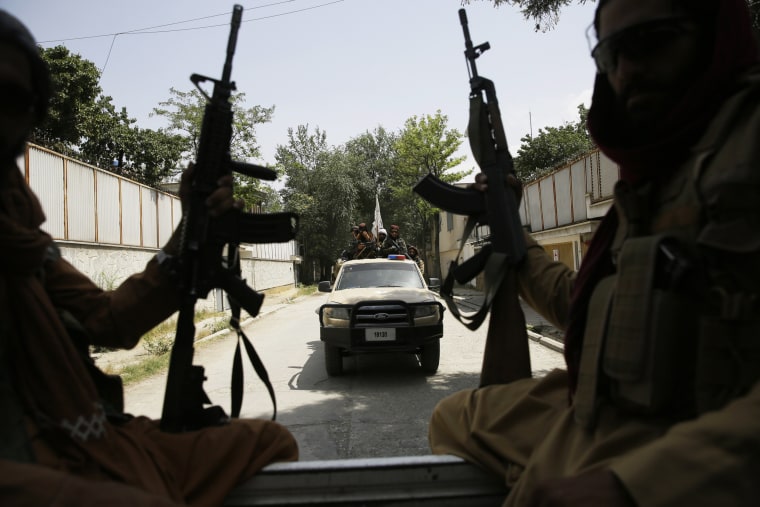What is the ‘Biden doctrine’? Afghanistan pullout offers clues

More than a decade before he presided over America’s exit from Afghanistan, Sen. Joe Biden famously threw down his napkin during dinner in 2009 with Hamid Karzai, the Afghan president at the time, and walked out.
What he’d heard from Karzai hadn’t convinced him that the U.S., through its military might, could fix what was broken in Afghanistan. Biden, who had just been elected vice president but hadn’t yet been inaugurated, flew home to brief President-elect Barack Obama, telling him the country had “deteriorated over the last six years.”
“The truth is that things are going to get tougher in Afghanistan before they get better,” Biden told Obama as reporters were briefly allowed into the meeting in January 2009.
So it was no surprise to his longtime former aides that Biden, now in charge, acted to end the war. What surprised some was how he did it. Jonah Blank, who advised him for nine years on the Senate Foreign Relations Committee, said Biden knew where he stood on keeping troops in Afghanistan by the time he returned from that trip.

“The failings of how we’re withdrawing from Afghanistan shouldn’t be confused with the question of whether to withdraw from Afghanistan,” Blank said. “The U.S. presence didn’t have to end this way — but it did have to end.”
The chaotic end to the war in Afghanistan, Biden’s first defining foreign policy decision alone in the driver’s seat, offers a window into how he believes the U.S. should wield its power: sparingly, when U.S. lives are at stake.
It is also raising serious questions about whether Biden has followed or eschewed his own advice about the need for American moral leadership, the importance of sober, competent execution and the value of acting in lockstep with allies.
For nearly half a century in politics, Joe Biden has preached what he has described as a pragmatic approach to foreign policy in which the U.S. uses its “soft power” to promote noble values like human rights and democracy and reserves its military power to protect core U.S. interests.
Terrorism, he has said, is “not an existential threat” to U.S. democracy. Conflicts with nuclear-armed regional powers, like China and Russia, potentially are.
But since Afghanistan’s fall this month, the distinction has surfaced in more painful ways. Biden’s rigid self-confidence and refusal to acknowledge mistakes in the face of disturbing images from the Kabul airport have been jarring to those who associate him with a particularly empathetic brand of politics.
“The idea that we’re able to deal with the rights of women around the world by military force is not rational,” Biden told ABC News this week, citing other abuses in China and in Africa. “There are a lot of places where women are being subjugated. The way to deal with that is not with a military invasion.”
In Biden’s view, according to current and former aides, along with Biden’s own words, that tiered approach to promoting U.S. values is the only way to preserve the running room to successfully confront America’s true existential threats: the rise of autocratic powers as global standard-bearers that threaten the ability of democracies like the U.S. to compete.
By that logic, Afghanistan, even as a failed state that represses women, would be less likely to threaten the U.S. in the long term than China would — a concern on which Biden hopes the U.S. can more effectively focus when it’s not distracted by decadeslong foreign conflicts.
Although Biden initially supported former President George Bush’s invasion of Iraq, for most of the last two decades he has opposed continuing the conflict and a U.S. objective of nation-building in the civil war-wracked country.
But other elements of Biden’s handling of the U.S. troop withdrawal have seemed at odds with his long-stated foreign policy principles, including planning for all contingencies and relying on the strength of alliances and global actions.
The Taliban takeover occurred more rapidly than the Biden administration had anticipated, stranding tens of thousands of people in danger, including U.S. citizens and thousands of Afghans who had been waiting for the State Department bureaucracy to churn out visas.
Jake Sullivan, Biden’s national security adviser, said this week that the administration was “clear-eyed” about a possible Taliban takeover but “did not anticipate that it would happen at this speed, though we were planning for these potential contingencies.” Even many Biden supporters have been perplexed about why, if he knew that was a possibility, his administration didn’t get more people out sooner.
And NATO allies who sent their own troops and diplomats to Afghanistan are dumbfounded at how they were caught off-guard by a U.S. timeline that left them with no choice but to accept the failure of their joint mission in Afghanistan.
“What does it say about NATO if we are entirely dependent on a unilateral decision taken by the United States?” a fuming former British Prime Minister Theresa May said this week.
In the coming years, Biden is likely to face similar choices about how deeply to entangle the U.S. — and with what tools — in fighting human rights abuses in places like China’s Xinjiang region, as well as where and when to involve the U.S. military from Haiti to Iran.
Hal Brands, a former Defense Department official who has written about “the emerging Biden doctrine,” said that by excluding human rights and democracy as compelling U.S. interests in Afghanistan, Biden may have made it harder to argue that they should be compelling interests globally going forward.




